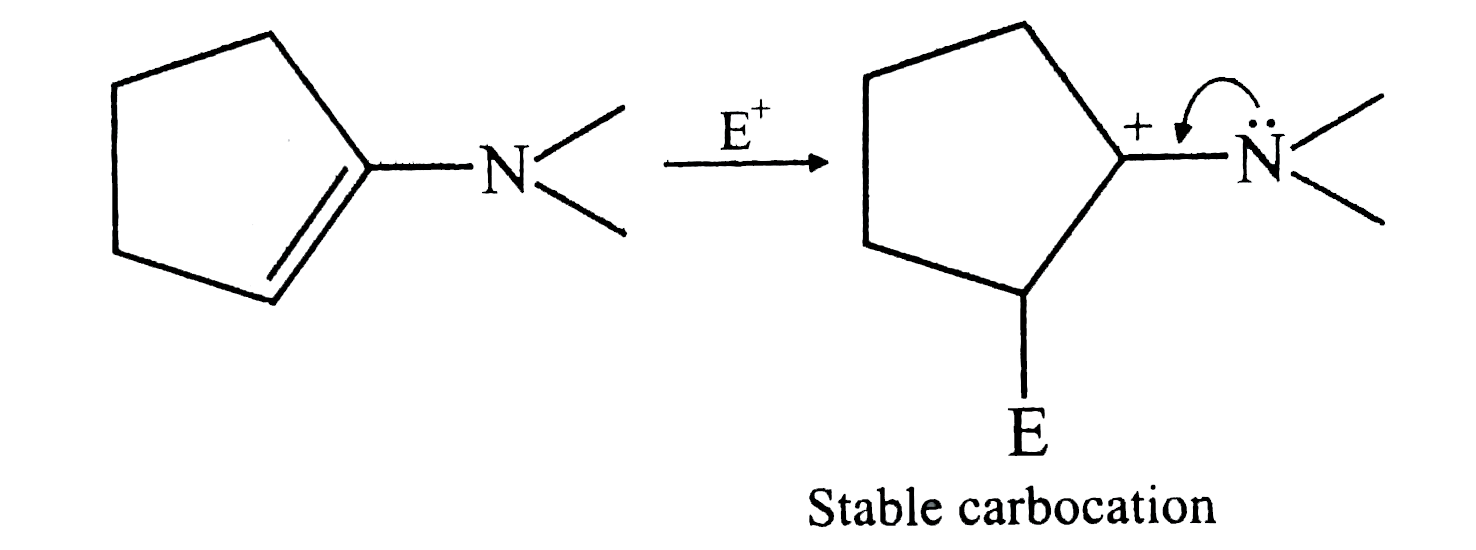Amines are well known to be stronges bases and nucleophiles than alkenes. Why do enamines, such as 1-dimethylaminocyclipentene, reacts with elecrophiles at a double bond carbon rather than at nitrogen?
The nitrogen is stericaly hindered by alktyl substituents
Nitrogen is more electronegatice than carbon
Ammonium cations are less stable tha carbocations
The carbocation formed by electrophilic attack at C-2 is stabilized by pi-bonding with the lone pair of electrons on nitrogen.
The correct Answer is:D

This is because of the formation of a stable carbocation.
Topper's Solved these Questions
- ORGANIC COMPOUNDS CONTAINING NITROGENBOOK - A2ZCHAPTER - ORGANIC COMPOUNDS CONTAINING NITROGENEXERCISE - Aromatic Amines And Diazonium Salts
61 Videos
- ORGANIC COMPOUNDS CONTAINING NITROGENBOOK - A2ZCHAPTER - ORGANIC COMPOUNDS CONTAINING NITROGENEXERCISE - Nitrocyanide And Isocyanides
32 Videos
- ORGANIC COMPOUNDS CONTAINING HALOGENSBOOK - A2ZCHAPTER - ORGANIC COMPOUNDS CONTAINING HALOGENSEXERCISE - Section D - Chapter End Test
30 Videos
- P BLOCK ELEMENTS ( GROUP 15,16,17,18)BOOK - A2ZCHAPTER - P BLOCK ELEMENTS ( GROUP 15,16,17,18)EXERCISE - Section D - Chapter End Test
30 Videos
Similar Questions
Knowledge Check
Amines are well known to be stronger bases and nucleophiles than alkcnes. Why do enamines, such as 1-dimethylaminocyclopentene, preferentially react with electrophiles at a double bond carbon rather than at nitrogen?
AThe nitrogen is stcrically hindered by alkyl subst.ituents.BNitrogen is more elcctoncgativc than carbon.CThe carbocation formed by electrophilic attack at C-2 is stabilized by π bonding with the lone pair of electrons on nitrogen.DAmmonium cations are less stable than carbocations.Q. 2-Bromopentane is heated with potassium in ethanol. the major product obtained is
A2-EthoxypentaneBPentane-1-Ccis-Pentene-2Dtrans-Pentene-2Q. 2-Bromopropane is separately heated with aq. CH3CO2Na or with CH3CH2ONa/CH3CH2OH, the major product obtained in each case respectively are
Apropene, isopropyl ethyl etherBisopropyl acetate, propeneCisopropyl acetate, isopropyl ethyl etherDpropene in both the cases
Ester gives nucleophilic addition reaction followed by elimination reaction with carbon nucleopile. When carbon nucleophile is of an ester then the reaction is known as Claisen condensation reaction. This reaction is also carried out between ester and a ketone. A suC Cessful Claisen condensation requires an ester with two α− hydrogens and an equivalent amount of base rather than a catalytic amount of base.
Intramolecular Claisen condensation given diester is known as :
View SolutionEster given nucleophilic addition reaction followed by elimination reaction with carbon nucleophile . When carbon nucleophile is of an ester then the reaction is know as Claisen condensation reaction. This reactions is also carrie out between ester and a ketone. A successful Claisen condensation requires an ester with two α - hydrogens and a an equivalent amount of base rather than a cataytic amount of base .
Intramolecular Claisen condensation given by diester is known as :
View SolutionEster gives nucleophilic addition reaction followed by elimination reaction with carbon nucleopile. When carbon nucleophile is of an ester then the reaction is known as Claisen condensation reaction. This reaction is also carried out between ester and a ketone. A suC Cessful Claisen condensation requires an ester with two α− hydrogens and an equivalent amount of base rather than a catalytic amount of base.
In the given reaction
_E01_757_Q01.png)
[X] is :
View SolutionAn alkyl halide with β-hydrogen atoms on reaction with a base or a nucleophile has two competing paths. Substitutions (SN1 and SN2) and elimination (E1 and E2). The path adopted by them depends upon the nature of the alkyl halide, strength and size of the base/nucleophile and reaction conditions. The bulkiers nucleophile prefers to act as a base and abstracts a proton rather than approaching a tetravalent carbon atom (due to steric reasons) and vise versa. A primary alkyl halide can react by any of the four mechanism (SN2,SN1,E2 and E1) depending upon the stability or the intermediate carbocation or the substituted alkene formed and the reaction conditions and tertiary alkyl halide. The three possible paths (SN1,E1 and E2)
Neopentyl bromide undergoes dehydrohalogenations to give alkene though it has no β-hydrogen. This is due
View SolutionAn alkyl halide with β-hydrogen atoms on reaction with a base or a nucleophile has two competing paths. Substitutions (SN1 and SN2) and elimination (E1 and E2). The path adopted by them depends upon the nature of the alkyl halide, strength and size of the base/nucleophile and reaction conditions. The bulkiers nucleophile prefers to act as a base and abstracts a proton rather than approaching a tetravalent carbon atom (due to steric reasons) and vise versa. A primary alkyl halide can react by any of the four mechanism (SN2,SN1,E2 and E1) depending upon the stability or the intermediate carbocation or the substituted alkene formed and the reaction conditions and tertiary alkyl halide. The three possible paths (SN1,E1 and E2)
Isopropyl bromide on heating with a concentrated solution of alcoholic (ethanolic) KOH predominantly gives
View Solution
